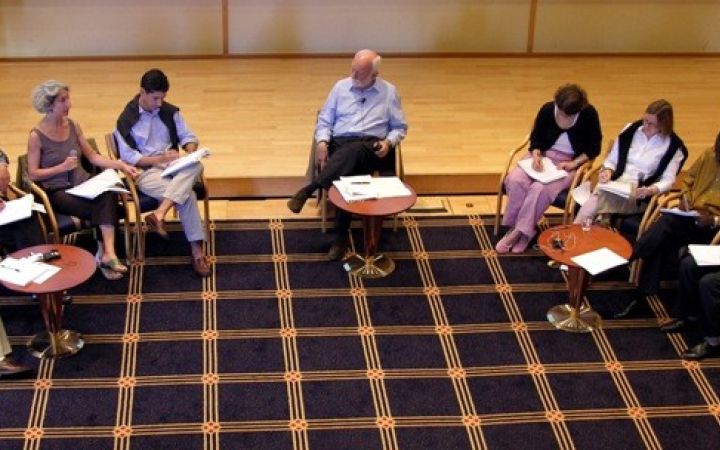30 Years Teaching Peace UNITAR’s Peacemaking and Conflict Prevention Programme Landmark Anniversary
As UNITAR celebrates its 60th anniversary, the Institute’s Peacemaking and Conflict Prevention Programme has reached the landmark 30th year deepening knowledge and strengthening skills in conflict analysis, negotiation, mediation and reconciliation. The Programme organizes high-level knowledge-sharing seminars for heads of peace missions, designs dedicated training programmes for diplomats, UN and regional organizational staff, and strengthens the capacities of Indigenous Peoples’ representatives working from grassroots to policy levels. In the second and third quarters, the flagship 30th Fellowship Programme in Peacemaking and Preventive Diplomacy was held outside Oslo with the largest group of female and male Fellows from around the world to date.
To date dedicated peacemaking and prevention programmes have been conducted at the continental level in Addis Ababa, for the Southern African Development Community (SADC) Sub-region, for French-speaking Central Africa as well as an African Women Peacemakers Programme. Preventive diplomacy and peacemaking programmes have been designed for Central Asia, for the Asia-Pacific region, and for Indigenous Peoples’ representatives at the international and regional levels building upon capacities to negotiate and advance the well-being of their Peoples and Nations. Much remains to be done, and critical resources are required, as conflict takes place in increasingly complex contexts. Officials, staff and representatives remain key change agents to build and sustain more peaceful, just and inclusive societies on a healthy planet
PROGRAMME HISTORY
In 1992, after the failure of the international community to prevent the First Gulf War, despite clear “early warning”, a scholar in conflict resolution carried out a needs assessment in New York finding there was little in the way of a “culture of conflict prevention and resolution” and instead, more a culture of “reaction and crisis management,” with no UN training programmes for UN staff or diplomats in negotiation and mediation. She then approached the Executive Director of UNITAR, Marcel Boisard, with a proposal to create an advanced training programme for senior and middle-level UN staff and diplomats that would over time influence enough people to bring about reform in the UN’s approach to conflict.
The UNITAR Fellowship Programme in Peacemaking and Preventive Diplomacy was first held in 1993 and is now in its thirtieth year providing intensive training to UN headquarters and peace mission staff, regional organization representatives and diplomats from around the world. Senior officials of the OAU in 1999, requested a similar Fellowship Programme be created at the regional level in Africa. The first annual continental programme was conducted in 2000, followed by SADC Sub-regional training programmes, dedicated training for Francophone Africa officials, an African Women Peacemakers Programme, and high-level knowledge sharing among senior African peacemakers.
Tailored training is organized in preventive diplomacy for the Asia-Pacific region. The first Seminar for Special and Personal Representatives of the Secretary-General was organized in 2001 with the participation of Kofi Annan. The regular SRSG Seminars provide an opportunity for the exchange of lessons and experience among the senior leadership to enhance UN practice. Based on the requests of Indigenous representatives and the recommendation of UN Special Rapporteurs, the UNITAR Training Programme to Enhance the Conflict Prevention and Peacemaking Capacities of Indigenous Peoples’ Representatives was first conducted in 2000. Peacemaking and Conflict Prevention Programme alumni work from the grassroots to policy levels to build more peaceful, just and inclusive societies.
Who
The UNITAR Peacemaking and Conflict Prevention Programme strengthens the capacities of senior and mid-level UN departmental and peace mission staff, regional organization representatives, diplomats from around the world, as well as Indigenous Peoples’ representatives and civil society in conflict analysis, negotiation, mediation and reconciliation to enhance their efforts to contribute to building lasting and inclusive peace.
2,753 senior and mid-level diplomats, peace mission and regional organization staff, civil society and Indigenous Peoples’ representatives have completed intensive advanced tailored training in peacemaking and conflict prevention to date – 40% female. Annual experience-sharing seminars and substantive knowledge-products have also been developed to enhance peacemaking and prevention.
Our Donors and Partners
For the international programme, the funding governments of Norway and Finland have two Fellows respectively who take part.
For regional programmes, funding representatives are invited to the Welcome Reception or Opening Session to engage with the participants and officials taking part.


